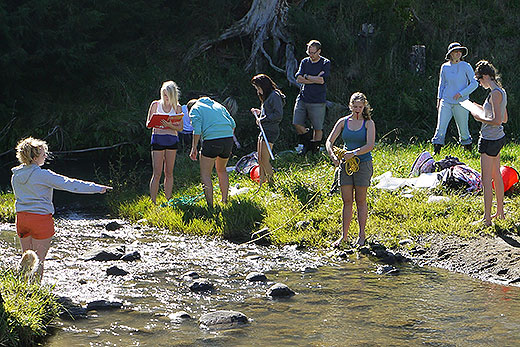A 'slice” of Katikati from forest to sea will come under intense scrutiny in March when scientists and amateurs attempt to identify every living organism in the environment within 24 hours.
With a working title of K2B2 (Katikati – two ‘Ks' and bio-blitz – two ‘Bs'), the ambitious project begins 11am Friday, March 6, and ends 11am Saturday, March 7.
Studies of aquatic life will be among those undertaken in the bio-blitz at Katikati in March.
Bio-blitz co-ordinator and retired scientist Peter Maddison those involved will be looking at sample areas from the top of the Kaimai Range to the Tauranga Harbour and recording everything from bacteria and fungi, to insects and birds, to native and exotic plants – 'both on land and in the water”.
Peter was involved in a similar bio-blitz at Miranda last year, when 1200 different species were identified, but he's expecting many more to be found in the Katikati blitz because it's a much more diverse eco-system.
The blitz has been initiated by the Uretara Estuary Managers, a Katikati group formed to manage and improve the Uretara Stream estuary and work with landowners, government, district and region councils and other agencies to restore and plant stream banks in the upper catchment.
Spreading the word about the need to protect and restore streams and estuaries is also an aim, which is one of the reasons for the bio-blitz.
The March bio-blitz's headquarters will be at Katikati Memorial Hall, where information on what's discovered will be recorded.
'We have a goal of recording 240 species an hour and I think we'll achieve it,” says Peter.
A team of scientists from Auckland University, Ag Research, Department of Conservation, Landcare, Western Bay of Plenty District and Bay of Plenty Regional councils and Forest and Bird will join school students, Katikati locals and anyone else keen to be involved.
'We may find something quite rare, like the Peripatoides novaezealandiae which is described as the missing link between insects and worms.”
Some of the more complex work like recording bacteria will be carried out before the 24-hour blitz because to be identified they have to be cultured in a laboratory situation.
Nothing will be overlooked. Even home gardens will be investigated to record every kind of plant, insect and birds, says Peter.
'If we don't know what anything is, we'll endeavour to have experts who can help identify it.”
Even farm and domestic animals and what lives on and in them will be recorded via local vets.
Peter also wants to know what lives inside Katikati's human population, hoping for assistance from the medical profession to source this information.
During the 24 hours, speakers will hold seminars in the hall, talking about their areas of expertise.
Organisers are encouraging as many people as possible to be involved in K2B2. To register, email Uretara estuary manager Sue Morris at suemorris60@gmail.com or Janet Price at janetplanet54@gmail.com with K2B2 in the subject line.



0 comments
Leave a Comment
You must be logged in to make a comment.